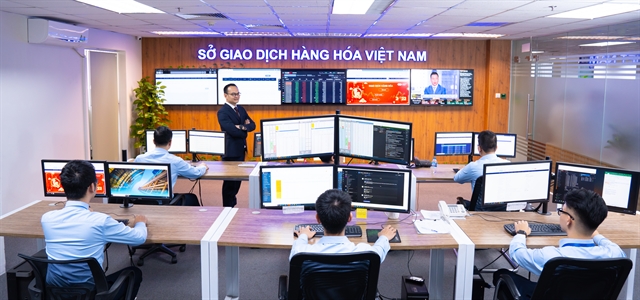After the Mercantile Exchange of Viet Nam (MXV) was allowed to connect with international exchanges, the domestic commodity trading market was organised to operate stably and sustainably, creating the premise for breakthrough developments.

After the Mercantile Exchange of Viet Nam (MXV) was allowed to connect with international exchanges by the Ministry of Industry and Trade, the domestic commodity trading market was organised to operate stably and sustainably, creating the premise for breakthrough developments.
Ending Thursday, the trading value at MXV exceeded VND10 trillion (US$438 million) for the first time, a milestone in the development of the commodity trading market in Viet Nam.
Boost from agricultural products
According to the MXV Transaction Management Division, the value of commodity trading on Thursday reached VND10.29 trillion. Of which, the agricultural product group accounted for 49 per cent, and energy group accounted for 30 per cent of cash flow from domestic investors.
At MXV, there are 31 commodities with 38 types of futures contracts, which are standard, mini and micro futures contracts.
The agricultural product group consists of commodities linked to the Chicago exchange such as corn, soybeans, soybean meal, soybean oil, Chicago wheat, Kansas wheat and raw rice. Meanwhile, the energy group has the US West Texas Intermedia (WTI) crude, RBOB blended gasoline, Nymex-linked natural gas, and ICE-linked Brent crude and low-sulfur oil.
On Thursday, news about tensions in the Black Sea region pushed the May Brent crude futures to exceed $102 a barrel during the session, which was the highest since mid-2014. However, after the US Energy Information Administration (EIA) announced that crude inventories unexpectedly increased by 4.5 million barrels last week, the rallies cooled down. Closing the trading day, the May Brent crude futures increased by 1.46 per cent to $95.42 a barrel, while WTI crude for April delivery rose by 0.77 per cent to $92.81.
On the other hand, the agricultural product group also witnessed the strongest fluctuations in recent years. Chicago wheat prices maintained the ceiling price for most of the session on Friday.
The rally trend was driven by escalated tension between Russia and Ukraine as the two countries are the world's biggest and world's third wheat exporters respectively. In just the last three trading sessions, the wheat price has jumped more than 16 per cent, and is expected to continue to rise if supplies from the Black Sea region are interrupted for a long time.
Soybean is another commodity that received a lot of attention from investors. In the morning trade on Friday, soybean price rose by 80 cents/bushel, then reversed sharply in the evening session and closed with a decrease of 17 cents.
Flexibly connecting to the world
MXV said that commodity trading activities connecting with the world take place 24 hours a day, from Monday to Friday every week. Matching transactions are done with the T-0 mechanism, which means that investors can close their buy/sell positions at any time.
This is the outstanding advantage of commodity trading compared to other traditional investment channels, especially in trading sessions where the market is mixed.
Duong Duc Quang, Deputy General Director of MXV, said that the T-0 transaction mechanism has helped the cash flow circulate very quickly in volatile sessions. Investors mainly choose the short-term surfing approach, meaning that after taking profits they can immediately switch to trading other commodities that are more active.
Crude oil typically trades in volumes above 1 million contracts per day, while agricultural commodities also trade in average volumes between 200,000 and 500,000 contracts. Therefore, in one trading day, investors can open many long/short positions in many commodities without any liquidity problems.
In addition, not only opening long positions when expecting prices to increase, investors can also open short positions with the expectation that the price will decrease. This helps open opportunities to profit whether commodity prices rise or fall.
Data from 36 market participants showed that despite the record increase in the trading value, the order matching activities of investors in Viet Nam are still stable and smooth without any problems. The operations of suspending orders, changing orders and cancelling orders are still directly connected to the international exchanges with a latency close to zero. This is possible thanks to the large investment in technology and infrastructure of MXV over the years. VNS





